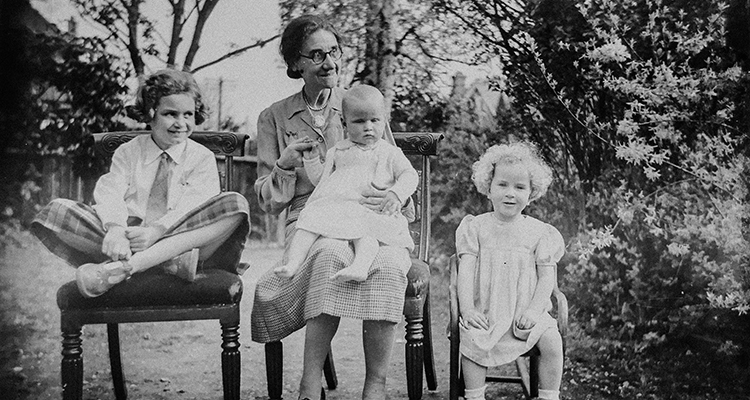Is Insomnia Hereditary? What Your Family Tree Can Tell You
You can likely thank your parents for your green eyes, brown hair, and tall stature. But what about your inability to sleep? With over 30% of all adults experiencing some form of insomnia, the cause of this prevalent sleep disorder is constantly under the microscope.

Most cases of insomnia are caused by something else, whether it’s a medical condition, stress, or other external factors. You may be wondering if insomnia is hereditary and, if so, how you can prevent yourself and the generations that follow from battling sleep disruptions all their lives.
Here we’ll take a closer look at what role genetics play in the development and treatment of insomnia and how you can use this information to find relief.
Content
Are Genes to Blame for Your Insomnia?
The answer to this question is a complicated one. While some genes may put you at greater risk of developing insomnia, it’s more about gene expression than the genes themselves. Most forms of insomnia are triggered by external factors like stress or underlying medical conditions. This is true for both chronic and acute insomnia.

Chronic insomnia is identified as trouble falling and staying asleep more than three days a week for three consecutive months or more. Acute insomnia is more short-term and often triggered by a specific event like an injury or time change.
In addition to your genes, psychological and physiological factors also contribute to your inability to sleep. Some examples include drinking caffeinated beverages too close to bedtime, too much screen time before bed, or not maintaining a consistent sleep schedule. Many of these behaviors are habitual and it takes some time for people to realize they’re the root of the problem.
These “bad habits” don’t negate the fact that some people are simply predisposed to developing insomnia. Certain genes may trigger your brain to be more alert at night, while others can prevent you from entering a deep REM cycle. Evidence also suggests that specific genes are directly related to sleep including certain neurotransmitters and circadian rhythm genes, which control your body’s natural sleep/wake cycle.
The Role of Gene Expression
There’s a minor yet significant difference between your genes and how those genes express themselves. Genes provide a roadmap that makes you the unique individual that you are, but not every area of that road map is expressed equally. A range of external factors determines which genes are expressed and which remain dormant.
For example, your behavior, psychology, and overall personality are a result of gene expression, not of your biological genes. Certain parts of your genes are used more frequently than others, based on which ones you naturally stimulate. Genes act like a blueprint for how we function by producing the proteins we need to perform specific tasks.
If you exercise frequently, your body will produce more proteins for building muscle and cardiovascular endurance. Gene expression is what allows humans to adapt to their changing environments.
In terms of insomnia, two things need to happen for your genetics to trigger a sleep disorder. First, you must be genetically predisposed to insomnia. Secondly, environmental factors must be present that trigger your insomnia gene to “turn on”. Because it takes two distinct pieces of a larger puzzle to develop insomnia, there’s no clear-cut evidence that this sleep disorder is hereditary.
Is Insomnia Hereditary?
Not exactly. You can’t inherit insomnia the way you can inherit cystic fibrosis, chromosome abnormalities, or other genetic disorders. Instead, you can inherit the risk of developing insomnia. Remember, gene expression plays a big role in your sleep habits. Your behaviors and tendencies (which are sometimes inherited) can influence which genes are expressed and which remain dormant.

It’s important to note that this isn’t always the case. Not every individual predisposed to developing insomnia will experience trouble sleeping and not all insomnia sufferers show these specific gene expressions. What it does mean is that if you’re predisposed to developing insomnia, you may need to take extra measures to keep restless nights at bay and achieve a quality night’s sleep.
The good news is, once you identify your triggers, you can make certain lifestyle changes to prevent the onset of insomnia.
Other Factors that Affect Genes and Gene Expression
With stress keeping millions of people up at night, it’s no surprise that stress is also one of the main triggers of genetically predisposed insomnia. While this connection between stress and lack of sleep is pretty easy to see, the biology behind it isn’t quite so clear.

Traumatic or particularly stressful events can directly impact gene expression, altering your genetic code. This process is known as epigenetics. Some evidence shows that this process is hereditary but is also reversible. Studies are ongoing as scientists uncover the effect of epigenetics on how the body responds to stress and regulates sleep patterns.
The truth remains that whether discussing acute or chronic insomnia, or even gene expression, the cause is often something else. Primary insomnia, which generally presents itself on its own, is very rare. Most forms of insomnia are considered secondary, which means they’re the result of something else. The same can be said for hereditary insomnia. While you may be predisposed to sleep trouble, a bigger underlying problem must present itself and trigger the gene expression that causes sleepless nights.
Other than stress, here are a few of the main triggers for hereditary insomnia.
Depression and Anxiety
Depression and anxiety are the two most common mental health disorders impacting adults. While both of these conditions can cause extreme fatigue, they can also interrupt sleep patterns, making it difficult to fall and stay asleep. Evidence suggests that individuals suffering from a mental health disorder like depression and anxiety are three times more likely to have family members with the same condition. This means that it may be a genetic mental health disorder that’s causing your insomnia and triggering certain gene expressions.
Medical Conditions
In addition to mental health disorders, medical illnesses can also put you at a higher risk of developing insomnia caused by gene expression. Diabetes is one of the most common hereditary conditions that can also trigger insomnia symptoms. Sadly, lack of sleep can also worsen diabetes symptoms, creating an unhealthy cycle.
Your body reacts to lack of sleep the same way it reacts to insulin resistance brought on by diabetes. When your body responds less to insulin, less sugar is made into glucose and stored in your body which can cause high blood sugar levels. If you inherited diabetes and are also struggling with insomnia, there may be a significant link between the two.
Preventing Inherited Insomnia
While biology and genes may have something to do with your sleep troubles, your lifestyle choices and behaviors are also directly related to your ability (or inability) to fall and stay asleep. As you struggle to identify the root cause of your insomnia issue, there are a few things to keep in mind.

Even if you’re genetically predisposed for insomnia, you can take certain steps to prevent the gene expression that causes sleep disruptions.
Reduce Stress
Reducing stress can benefit you in countless ways, both mentally and physically. Stress is to blame for numerous medical conditions including high blood pressure, obesity, heart disease, and mental health disorders. By reducing stress, you’re not only improving your overall health and well-being, but you’re lessening your risk of developing insomnia.
Stress-reducing activities like yoga, meditation, and exercise can all help strengthen your mind and body. Life is bound to be stressful but the more steps you can take to reduce that stress, the less likely you are to trigger insomnia-related gene expression.
Set a Sleep Schedule
We already mentioned that certain genes are directly related to your sleep patterns, like the gene that controls your circadian rhythm. This is your body’s natural sleep/wake cycle. One way to help regulate this gene is to adopt a consistent sleep schedule. Try going to bed at the same time each night and waking up at the same time each morning will help train your brain and body to fall into a natural sleep pattern.
Create a Healthy Bedtime Ritual
In addition to setting a sleep schedule, you can also adopt a healthy bedtime routine that includes performing certain behaviors each night. Things like journaling, practicing meditation, or reading a book are all great ways to relax your body and mind before falling asleep. Avoid watching television or using other digital devices with blue lights. Studies show that the lights emanated by these devices prevent your body’s natural production of melatonin, the sleep hormone.
There is Hope for Treating Hereditary Insomnia
Research continues on just how much genes impact your ability to achieve a quality night’s sleep. While you can’t control genetics, you can control the behaviors and lifestyle choices that may trigger sleep problems.

Reducing stress, adopting consistent sleep habits, and leading a healthy lifestyle are all useful tools in keeping insomnia at bay. At Somnus Therapy, we offer a multi-faceted approach to identifying the root cause of your insomnia and finding the best treatment options. These include mindfulness exercises, sleep restriction, stimulus control, and cognitive restructuring. Our unique online approach allows you to complete the program in the comfort and privacy of your own home.
Click here to start your journey toward a blissful night’s sleep and more energetic and productive days.













